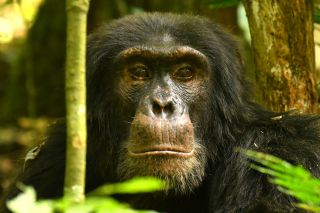Politics
The Chimpanzee War
The (chimpanzee) politics of sudden power transfer.
Posted April 28, 2023 Reviewed by Tyler Woods
Key points
- The male power hierarchy is a central feature of chimpanzee social life.
- Typically, a new alpha assumes command after a period of strategy and aggression.
- In a novel and uncertain situation, understanding of others’ knowledge states could prove decisive.
"Alpha" is a position of enormous strength and importance for chimpanzees. Before the war and the split of the Ngogo chimpanzees into two groups, Jackson was alpha of everyone, more than 200 chimpanzees. He spent his time mostly in the center of his kingdom, and there were lesser alphas in the outlying areas (Richmond, to the west, for example), but Jackson was undisputed. As his reign stretched on, some younger and stronger rivals, politically astute in their own right, began positioning for the natural course of power transfer. Abrams, some thought, would be next. Or maybe Richmond’s brother, Hutcherson. But then came the war among chimpanzees. Hutcherson did ascend to Western alpha, and the Westerners began a murderous campaign against their former brothers in the center and east.
A failure of leadership
When I arrived for my second visit to Kibale National Park, in Uganda, where the Ngogo live, in August 2022, the split had been complete for some time. Jackson had been killed. Both sides had lost strong males as well as infants, and the West had emerged clearly the stronger of the two. The Westerners gained substantial ground, pushing into Central territory, with its rich food resources, and drawing new boundaries. The Centrallers were unaccountably scattered, retreating with less pushback than researchers had expected given their count of able-bodied males. They had no alpha. Abrams seemed the most likely, maybe Carter, both with youth and strength. Old Morton seemed to be supporting Abrams’ potential candidacy, which was an auspicious sign. But there was no organization, none of the strict hierarchy chimps are known for, the maintenance of which typically occupies much of their time. Among the researchers, a likely explanation seemed that they didn’t know Jackson was dead.

An attempted coup of a sitting alpha would be dangerous even in his absence, since healthy male chimps are known to occasionally take off on month-long “consorts” with favored females, returning unexpectedly and with vigor. Although several chimpanzees had been present when Jackson was mortally wounded, including, of course, his Western killers, only one Centraller—Peterson—was present when he actually died the next morning of his wounds, having accompanied him in his final hours. Peterson was a strong male himself, but, like Abrams and Carter, he made no serious play.
Peterson’s quandary
It is an interesting dilemma, this knowing. If he were able to understand that he alone knew the king was dead, this would give him a significant advantage in the pursuit of the Central alpha position—others would be cautious in their self-advocacy and he might secure and bolster the position through various uncontested alliances and well-placed bouts of aggression in this window of uncertainty. He did not take advantage. There could be other reasons for Peterson not doing so, but if we carry along with the knowing idea: (1) Peterson would have to realize he knew—he’d have to explicitly recognize his own knowledge. (2) He’d have to know others did not know—he’d have to reason about the knowledge of others, specifically that their absence from the scene of Jackson’s death had implications for what they (didn’t) know. And (3) he’d have to understand the permanence of death. All three are pretty big ideas. Since a researcher was also present (at some distance) at the moment of Jackson’s death, the location was known and he was quickly buried. No other chimps had occasion to see his lifeless body. **
Even if Peterson wished to convey this information to a select few for the purposes of strategic alliance, how could he, in the absence of language? And since Jackson did not go the typical way—a gradual waning of power and eventual yield to the maneuverings of another—there seemed no one fully prepared to take the reins. This, in the context of general uncertainty about where he was and chimpanzees’ difficulty understanding what others think, seemed to have hamstrung the transfer of power. Negotiations remain underway among the Centrallers.
The (potential) benefits of knowing who knows
Chimpanzees are socially sophisticated. Their dominance hierarchies are not based solely on physical strength. What we might call politics—the accumulation of social capital through strategic alliances over time—play a significant role in the rise to leadership. Under conditions like this one, between the Westerners and the Centrallers, insight into others’ states of knowledge could be decisive. If chimps are able to use insights like these, we could see a leader emerge who is able to take differential advantage of those peers who do know the cause of Jackson’s absence and those who do not, those that do understand which of their peers harbor ambition, or know about secret weaknesses of opponents, and those that don’t. It would be an enormous leg up, and one more check (for better or worse) in the tally of similarities with ourselves. Evidence to date suggests that chimps are not using this information in the way we would, but the thought experiment is a fascinating one.
**This was done to preserve the skeleton for later research purposes; wild chimpanzee skeletons are extremely difficult to come by**
Update: Netflix has just released a series (Chimp Empire) on these Ngogo chimpanzees by the Oscar-winning nature film director James Reed, with gorgeous footage.


